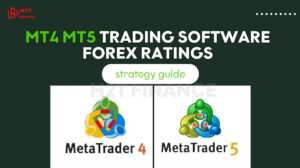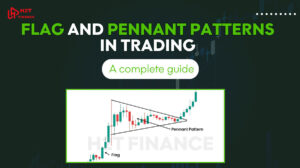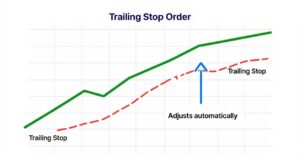Have you ever heard about Forex but aren't quite sure what Forex exchange trading truly entails? It stands as the world's largest and most liquid financial market, where various currencies are bought, sold, and exchanged. Grasping the foundational knowledge of Forex not only unveils a potential avenue for exploration but also deepens your understanding of how global economic factors interact with each other. Join H2T Finance as we embark on this exciting journey to explore the fascinating world of currency trading.
1. What is forex exchange trading?
At its core, "Forex" is simply an abbreviation for "Foreign Exchange". So, what is forex exchange trading? It's the act of buying one currency while simultaneously selling another, with the primary goal of profiting from fluctuations in their exchange rates. This global marketplace, often referred to as the foreign exchange market, facilitates these currency conversions. Think of it like this: when you travel to another country and exchange your home currency for the local currency, you're participating in a basic form of forex transaction.
Even if you're not considering professional trading, understanding the basics of Forex can be incredibly beneficial. It helps you become more aware of currency values when you're planning a trip abroad or purchasing goods online from international sellers. This knowledge can empower you to make more informed financial decisions in an increasingly globalized world.
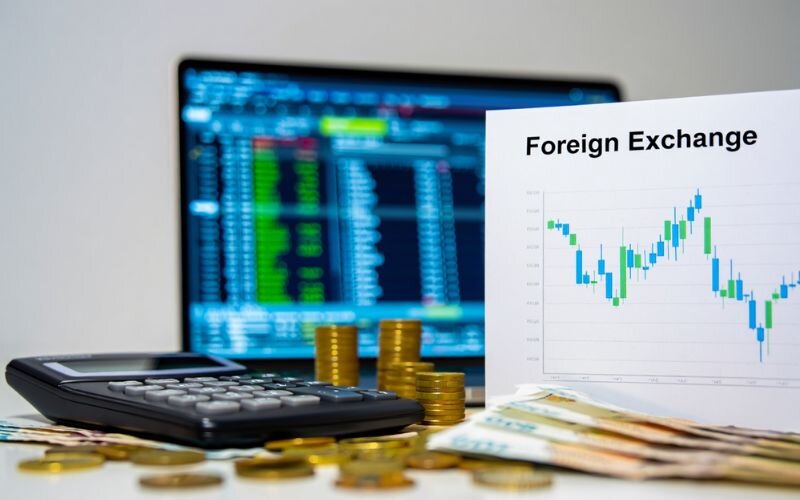
One of the defining characteristics of the Forex market is its decentralized nature. Unlike stock markets that often have a central physical exchange (like the New York Stock Exchange), Forex trading occurs "Over-The-Counter" (OTC). This means transactions are conducted electronically through a network of banks, financial institutions, and individual traders worldwide, rather than on one centralized exchange.
The sheer scale of the Forex market is astounding. It is the largest financial market globally, with an average daily trading volume often exceeding several trillion U.S. dollars. This immense volume underscores its significance in the global economy and contributes to its exceptionally high liquidity, meaning it's generally easy to buy or sell currencies without causing significant price changes.
2. Core forex concepts every beginner must know
To navigate the forex market effectively, understanding its fundamental building blocks is crucial. These core concepts will form the bedrock of your trading knowledge. This is an important part of forex basics.
2.1. What are currency pairs?
In the forex market, currencies are always traded in pairs. You're never just buying U.S. dollars, for example; you're buying U.S. dollars against another currency, or selling U.S. dollars for another currency. A common example you'll see is EUR/USD.
Each currency pair consists of two parts:
- The base currency: This is the first currency listed in the pair (e.g., EUR in EUR/USD). It's the currency you are effectively buying or selling. If you buy EUR/USD, you are buying Euros. If you sell EUR/USD, you are selling Euros.
- The quote currency (also known as the counter currency): This is the second currency listed in the pair (e.g., USD in EUR/USD). It's the currency you use to make the transaction. When you buy EUR/USD, you are using U.S. dollars to buy Euros.
The exchange rate displayed for a currency pair tells you how much of the quote currency is needed to buy one unit of the base currency. For example, if the EUR/USD exchange rate is 1.0850, it means that 1 Euro costs 1.0850 U.S. dollars. Understanding exchange rates is fundamental to grasping how profit or loss is determined.
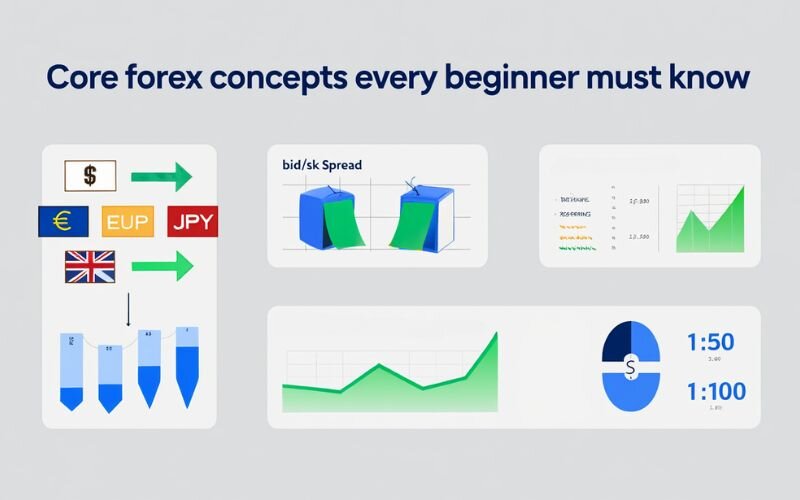
When I first started, I often got confused between the base and quote currency. The key is to remember: you're essentially "betting" on whether the base currency will strengthen or weaken against the quote currency. If you believe the Euro will strengthen against the U.S. dollar, you would buy EUR/USD. If you believe it will weaken, you would sell EUR/USD.
There are several categories of currency pairs:
- Majors: These are the most traded currency pairs globally and always include the U.S. dollar. Examples include:
- EUR/USD (Euro/U.S. Dollar)
- USD/JPY (U.S. Dollar/Japanese Yen)
- GBP/USD (British Pound/U.S. Dollar)
- USD/CHF (U.S. Dollar/Swiss Franc)
- AUD/USD (Australian Dollar/U.S. Dollar)
- NZD/USD (New Zealand Dollar/U.S. Dollar)
- USD/CAD (U.S. Dollar/Canadian Dollar)
It's generally recommended to start by learning about and perhaps practicing with major currency pairs. They typically offer high liquidity (meaning many buyers and sellers) and often have lower spreads (the difference between buying and selling prices), which can be more forgiving for new traders.
- Crosses (or Minor Currency Pairs): These are pairs that do not involve the U.S. dollar. They consist of two major non-USD currencies. Examples include EUR/GBP (Euro/British Pound) or EUR/JPY (Euro/Japanese Yen).
- Exotics: These pairs consist of one major currency paired with the currency of an emerging or smaller economy. Examples include USD/TRY (U.S. Dollar/Turkish Lira) or EUR/SGD (Euro/Singapore Dollar).
Exotic pairs often have wider spreads and can be more volatile (prone to sudden price swings) and less liquid than majors or crosses. They are generally not recommended for beginners until significant experience and understanding have been gained.
2.2. Bid, Ask, and Spread
When you look at a forex quote for a currency pair, you'll always see two prices listed. These are the bid price and the ask price. Understanding these is crucial for grasping the mechanics of how trades are executed and the initial cost involved.
- The bid price: This is the price at which your broker is willing to buy the base currency from you in exchange for the quote currency. From your perspective as a trader, this is the price you will receive if you sell the currency pair.
- For example, if the EUR/USD bid price is 1.0850, it means you can sell 1 Euro for 1.0850 U.S. dollars.
- The ask price (also sometimes called the offer price): This is the price at which your broker is willing to sell the base currency to you in exchange for the quote currency. From your perspective, this is the price you will pay if you buy the currency pair. The ask price will always be slightly higher than the bid price.
- For example, if the EUR/USD ask price is 1.0852, it means you need to pay 1.0852 U.S. dollars to buy 1 Euro.
The difference between these two prices is known as the spread. Initially, I didn't pay much attention to the spread, but I quickly learned that it directly impacts your profitability, especially if you plan to trade frequently (scalping or day trading). It represents a primary way forex brokers make money and is essentially the cost of executing a trade. A tighter (smaller) spread is generally more favorable for traders as it means the cost of trading is lower. For instance, using our example, if the bid is 1.0850 and the ask is 1.0852, the spread is 0.0002, or 2 pips (we'll cover pips shortly).
Always check the spread for the currency pair you intend to trade before entering a position. It's also important to know that spreads can be variable. This means they can widen (increase) or narrow (decrease) based on market conditions. Spreads might widen during times of high market volatility (e.g., around major news releases) or low liquidity (e.g., during certain trading session overlaps or holidays). This is a critical consideration for managing your trading costs and risk.
2.3. Pips and Lots: Measuring profit and position size
Once you understand currency pairs, bid/ask prices, and spreads, the next step is to learn how price movements and trade sizes are measured in the forex market. This is where "pips" and "lots" come into play.
-
Pip (Percentage in Point):
A pip is the smallest standard unit of price change in an exchange rate. For most currency pairs, a pip refers to the fourth decimal place in the quote. For example, if the EUR/USD moves from 1.0850 to 1.0851, that's a one-pip movement.
There's an exception for pairs involving the Japanese Yen (JPY), such as USD/JPY. For these pairs, a pip is typically the second decimal place. For instance, if USD/JPY moves from 150.10 to 150.11, that's a one-pip change.
Some brokers also quote "fractional pips" or "pipettes," which are a tenth of a pip (the fifth decimal place for most pairs, or the third for JPY pairs). While these offer more pricing precision, the standard unit of measure remains the pip. Understanding pips is essential because they are used to calculate your profit or loss on a trade.
- Lot:
A lot is a unit of measurement that determines the size of your forex trade, or the volume of the base currency you are buying or selling. The forex market uses standardized lot sizes:
-
- Standard lot: This is equivalent to 100,000 units of the base currency. If you trade one standard lot of EUR/USD, you are trading 100,000 Euros.
- Mini lot: This is equal to 10,000 units of the base currency, or one-tenth of a standard lot.
- Micro lot: This is equal to 1,000 units of the base currency, or one-hundredth of a standard lot.
Some brokers may even offer "nano lots" (100 units), though these are less common.
When you're just starting out, it's highly recommended to begin with micro lots or mini lots. This allows you to get a feel for the market and test your strategies with real money, but with significantly reduced risk compared to trading standard lots. Don't rush into trading larger lot sizes until you have gained consistent experience and a solid understanding of risk management. The size of your lot directly impacts the monetary value of each pip movement, and therefore, your potential profit or loss.
2.4. A brief look at leverage in forex trading
Leverage is a powerful tool in forex trading that often attracts newcomers, but it's also one that carries significant risk if not understood and managed properly. In simple terms, leverage is a facility offered by forex brokers that allows you to control a large trading position with a relatively small amount of capital in your account. This "borrowed" capital effectively amplifies your trading power.
For example, if your broker offers 1:100 leverage, it means that for every $1 of your own money (known as margin, which we'll cover in more detail in other articles), you can control a position worth $100. So, with just $100 in your account, you could potentially open a trade valued at $10,000.
The primary appeal of leverage is that it can magnify potential profits. If the market moves in your favor, even a small percentage change can result in a substantial return on your initial margin. However, it's crucial to remember the other side of the coin.
Leverage is a double-edged sword; it amplifies both potential profits and, equally importantly, potential losses. When I first started, I was very attracted to the idea of high leverage because I thought I could make money quickly. However, I soon realized that if a trade moved against me, high leverage could wipe out my trading capital just as fast. It's essential to use leverage consciously and choose a level that aligns with your risk tolerance and trading strategy.
Never use leverage to trade more than you can afford to lose. Many experienced traders recommend that beginners start with very low leverage, or even no leverage if possible, until they are consistently profitable on a demo account and have a solid risk management plan in place.
See more related articles:
- What is price action? Understanding core Forex concepts
- How do financial advisors get paid: Key models and pay structures
3. How does the forex market operate?
Unlike a stock market with a central physical location, forex is a truly global, interconnected network. As mentioned earlier, the market's structure is Over-the-Counter (OTC), or decentralized. This means that trades are executed directly between two parties through an electronic network.
Realizing this was a key moment for me. It means there is no single "boss" of the forex market. The price of a currency pair at any given moment is a reflection of the collective actions and sentiments of everyone involved, from the largest banks to individual traders like us. There is no single entity or exchange that controls the prices. Instead, prices are determined by the continuous forces of supply and demand from millions of participants all over the world.
This decentralized nature allows the forex market to have unique operating hours: 24 hours a day, five days a week. It starts on Sunday afternoon (EST) in Sydney, Australia, and follows the sun around the globe through Tokyo, London, and finally closes on Friday afternoon in New York. This 24-hour cycle is possible because of the overlap between these major financial sessions.
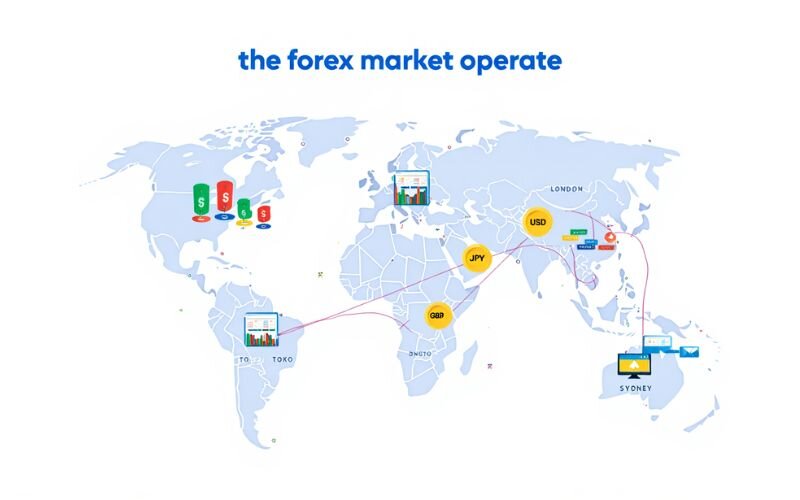
Each trading session has distinct characteristics. For instance, the London and New York overlap is typically the busiest and most volatile period of the trading day because both major markets are active. Understanding these session dynamics can help you choose a trading time that fits your personal schedule and strategy.
Another direct result of its global scale and constant activity is extremely high liquidity. At almost any time during the trading week, there are countless buyers and sellers for the major currency pairs. This high liquidity ensures that you can typically enter and exit trades quickly and with relatively low transaction costs (i.e., tighter spreads).
So, if no one controls the market, what influences it? While no single entity is in charge, the market is heavily influenced by a combination of factors, primarily the policies of central banks, major economic data releases, and significant geopolitical events.
4. Who are the main participants in the forex market?
The forex market is a vast ecosystem with a diverse range of participants, each playing a unique role and trading for different reasons. Understanding who these players are can provide a better perspective on market dynamics. These are the key participants in the forex market:
-
Major Banks (Interbank Market):
These are the largest players and form the backbone of the forex market. Giant commercial banks like Citibank, JPMorgan Chase, UBS, and Deutsche Bank handle enormous volumes of forex transactions daily, both for their own accounts (proprietary trading) and on behalf of their clients. The interbank market is where these large banks trade currencies directly with each other.
-
Central Banks:
Institutions like the Federal Reserve (USA), the European Central Bank (Eurozone), the Bank of England (UK), and the Bank of Japan play a crucial role. They can intervene in the market to manage their country's currency value, control inflation, or stabilize their economy. Their policy announcements and actions, such as changing interest rates, can have a significant impact on exchange rates.
-
Multinational Corporations:
Companies that operate internationally engage in forex trading for business-related purposes. For instance, a U.S. company buying supplies from Germany will need to convert U.S. dollars to Euros. They also trade currencies to hedge against the risk of adverse movements in exchange rates that could affect their profits from international sales or purchases.
-
Investment Funds and Hedge Funds:
These entities manage large pools of capital and trade forex for speculative purposes or to hedge their international investment portfolios. Hedge funds, in particular, are known for employing sophisticated strategies and can move significant amounts of money, thereby influencing market prices.
-
Forex Brokers (Retail Brokers):
These firms provide individual traders (like you) with access to the forex market. They act as intermediaries, connecting retail traders to the larger interbank market or sometimes acting as the counterparty to their clients' trades. They offer trading platforms, leverage, and customer support.
-
Retail Traders:
This category includes individuals who trade forex for their own accounts, typically with smaller capital compared to institutional players. They aim to profit from speculating on currency price movements. The rise of online trading platforms has made the forex market much more accessible to retail traders.
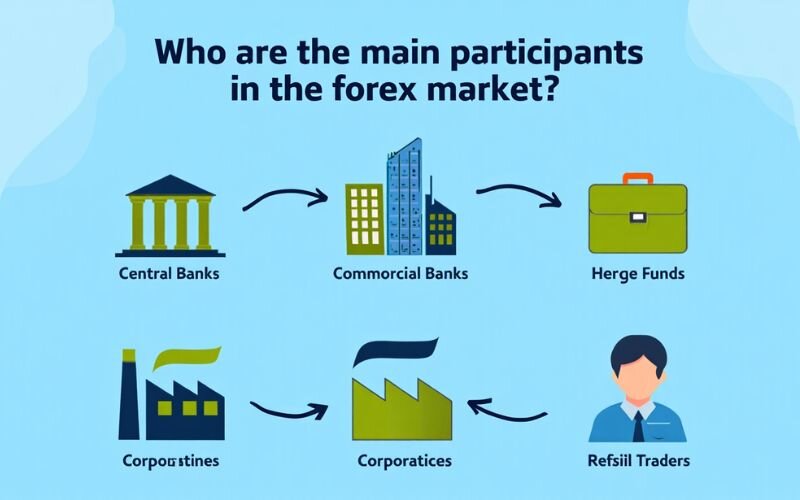
As a retail trader, it's humbling to realize you're navigating a market alongside these "big fish". Understanding the motivations and potential impact of these larger participants can help you develop a more realistic view of market behavior and why prices move the way they do. You're not just trading against other retail traders, but in an environment shaped by global institutions.
5. Why do people engage in forex exchange trading?
The forex market attracts millions of participants for a variety of reasons, ranging from practical business needs to the pursuit of investment opportunities. Understanding these motivations can shed light on why this market is so active. Here are some of the primary reasons people trade forex, highlighting some potential benefits of forex trading:
- Profit Potential:
This is arguably the most common motivation for retail traders. The forex market is constantly fluctuating, and these price movements create opportunities to profit from both rising and falling currency values. Traders can go "long" (buy) if they expect a currency pair's value to increase, or go "short" (sell) if they expect it to decrease, offering flexibility in various market conditions.
- High Liquidity:
As the world's largest financial market, forex offers exceptional liquidity, especially for major currency pairs. This means there are generally always buyers and sellers available, allowing traders to enter and exit positions quickly and efficiently without significantly impacting the market price.
- Accessibility:
Compared to some other financial markets, forex trading has become highly accessible to the average individual. Many brokers allow you to start with relatively low initial capital, and online trading platforms can be accessed from almost anywhere with an internet connection.
While accessibility is a plus, don't let the ease of starting lead to complacency. This ease of entry can also mean easy losses if you're not adequately prepared with knowledge and a solid trading plan.
-
24/5 Market Operation:
The forex market operates around the clock, five days a week. This provides flexibility for traders to participate at times that suit their schedules, regardless of their time zone. Whether you're an early bird or a night owl, there's likely an active trading session.
-
Leverage:
As discussed earlier, brokers offer leverage, which allows traders to control a larger position with a smaller amount of capital. While this magnifies both potential profits and losses (and must be used with extreme caution), it is a feature that attracts many to the forex market.
-
Low Transaction Costs:
For many forex trades, the primary transaction cost is the spread (the difference between the bid and ask price). Compared to other markets that might involve commissions, fees, and other charges, forex can be relatively cost-effective, especially for active traders.
-
Portfolio Diversification:
For some investors, forex trading can be a way to diversify their investment portfolios. Currencies can behave differently from other asset classes like stocks or bonds, potentially offering a hedge or a non-correlated return stream.
6. How is forex trading different from stock trading?
While both forex and stock trading involve speculating on price movements to make a profit, they are distinct markets with fundamental differences. Understanding these distinctions can help you decide which, if any, might be more suited to your interests and trading style. This section directly addresses the common question: "How is forex different from stock trading?" and looks at forex vs stocks.
Here's a comparative overview:
| Feature | Forex Exchange Trading | Stock Trading |
| Asset Traded | National currencies | Shares/equity in publicly traded companies |
| Market Size | Largest financial market in the world | Large, but significantly smaller than Forex |
| Trading Hours | 24 hours a day, 5 days a week | Limited to specific exchange hours (e.g., 9:30 AM - 4:00 PM ET for NYSE) |
| Leverage | Typically, high leverage is available | Lower leverage, or none for basic share dealing |
| Liquidity | Extremely high, especially for major pairs | Varies greatly depending on the stock |
| Primary Influences | Macroeconomic data, central bank policies, and geopolitical events | Company performance, industry trends, earnings reports, and overall market sentiment |
| Ownership | No ownership of an underlying asset; speculation on exchange rate movements | Ownership of a small part of the company (shares) |
| Focus | Broad macroeconomic analysis, currency strength | Company-specific (micro) and industry analysis |
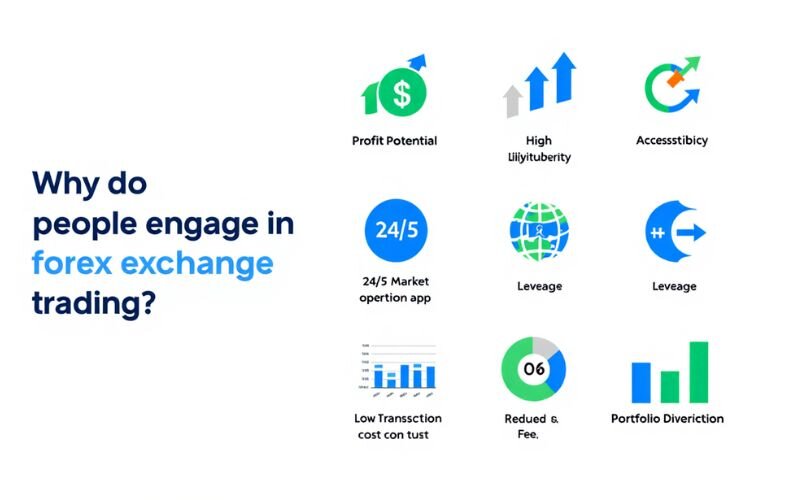
Let's delve a little deeper into some key differences:
- Nature of the Asset: When you trade forex, you're trading one currency against another. You don't actually own any physical currency or underlying asset in the same way you own a piece of a company when you buy its stock. You are purely speculating on the change in the relative value between two currencies.
- Market Focus: Forex trading often requires a greater focus on macroeconomic factors – interest rates, inflation, GDP growth, political stability of entire countries. Stock trading, while influenced by broader economic trends, also involves a deep dive into the specific company's performance, management, products, and industry position.
- Leverage Availability: Forex brokers generally offer significantly higher leverage than stockbrokers. This can amplify gains and losses more dramatically in forex.
-
Market Hours and Accessibility: The 24-hour nature of forex offers more flexibility than the fixed hours of most stock exchanges.
If you are more inclined towards analyzing global economic trends, international relations, and monetary policies, forex might appeal to you. If you prefer researching individual companies, their financial health, and growth prospects, then stock trading could be a better fit. Many traders and investors actually participate in both markets as part of a diversified strategy, as they can offer different opportunities and respond differently to various economic conditions.
7. Considerations to get started with forex exchange trading
If the world of forex exchange trading has piqued your interest, you might be wondering how to take your first steps. It's crucial to approach this market with a mindset of continuous learning and caution. Here are some initial considerations for anyone looking to learn forex trading or engage in currency trading for beginners:
-
Education is key:
This cannot be overstated. Before risking any real money, invest significant time in educating yourself about how the forex market works, the concepts we've discussed (currency pairs, pips, lots, leverage, etc.), different trading strategies, risk management techniques, and how to analyze the markets (both technical and fundamental analysis).
Don't ever think you've learned enough! The market is dynamic and constantly evolving. I make it a point to read financial news daily, revisit core concepts, and explore new strategies. Reputable books, online courses from trusted sources, and educational resources from financial websites (like H2T Finance!) can be invaluable.
-
Practice with a Demo Account:
Almost all forex brokers offer demo accounts. These allow you to trade with virtual money in real market conditions. This is an essential step.
Treat your forex trading demo account as if it were real money. Develop and test your trading plan, practice executing trades, and get comfortable with your trading platform. Aim for consistent profitability on a demo account for at least a few weeks, ideally a few months, before even thinking about trading live. This is your "flight simulator" for trading.
-
Choosing a reputable broker:
Selecting the right broker is a critical decision. Look for brokers that are regulated by a credible financial authority in their jurisdiction. Other factors to consider include their spreads and commissions, the quality of their trading platform, customer support, and the range of instruments offered.
A crucial tip here is not to choose a broker solely based on attractive bonuses or high leverage offers. These can often be traps for unwary beginners. Prioritize safety of funds and fair trading conditions.
-
Develop a trading plan:
A trading plan is your roadmap. It should clearly define your trading goals, risk tolerance, the strategies you'll use to identify trading opportunities, rules for entering and exiting trades, and your money management rules. Trading without a plan is like navigating a ship without a compass.
-
Master risk management:
This is arguably the most important aspect of successful trading. The number one rule should always be: never trade money you cannot afford to lose. Always use stop-loss orders to define your maximum acceptable loss on any single trade. Determine your position size carefully so that a single loss doesn't cripple your account.
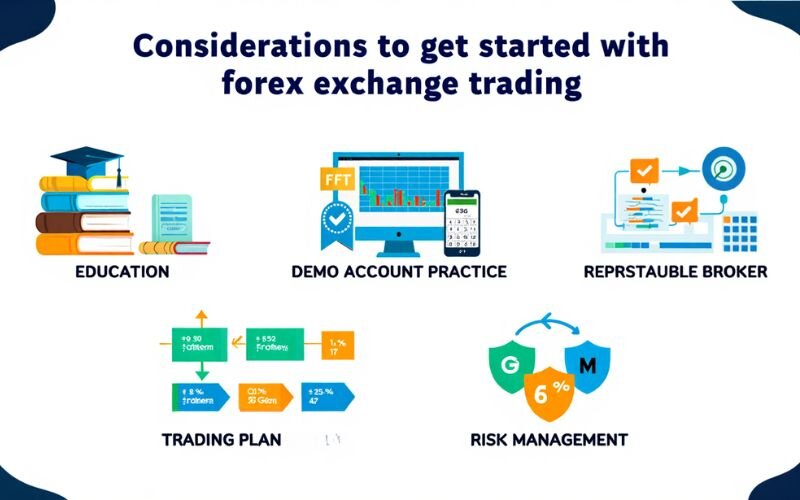
So, what do you really need to start forex trading? Beyond a computer and internet access, you need solid knowledge, a well-thought-out plan, disciplined execution, and most importantly, the right mindset – one that embraces continuous learning, patience, and respect for market risks.
8. Understanding the key risks in forex trading
While forex trading presents opportunities, it's vital to be aware of the inherent risks of forex trading. Acknowledging these risks is the first step toward responsible trading.
- Leverage Risk: This is paramount. Leverage amplifies both potential profits and, crucially, potential losses. A small adverse market move can lead to significant losses, especially with high leverage. Misunderstanding or misusing leverage is a primary reason many beginners lose money.
- Market Risk: Forex markets can be volatile. Sudden price swings due to economic news, political events, or unforeseen global circumstances can occur. Without proper risk management, such as using stop-loss orders, these swings can result in substantial losses.
- Psychological Risk: Your own emotions can be a significant risk. Fear might make you close good trades too soon, while greed can lead to taking oversized risks or overtrading. Developing emotional discipline and sticking to a trading plan is essential to mitigate this. Learning to manage the fear of losing and the desire for quick profits was a major hurdle for me. Sticking to my pre-defined plan, regardless of momentary emotions, became crucial for survival and growth.
- Broker Risk: The choice of your broker matters. Risks can include platform failures or, in rare cases, dealing with an unregulated or unscrupulous broker. Always choose a well-regulated broker to safeguard your interests.
- Country/Political and Interest Rate Risks: The economic health and political stability of countries, along with central bank interest rate policies, directly influence currency values. Unexpected changes can cause sharp market movements.
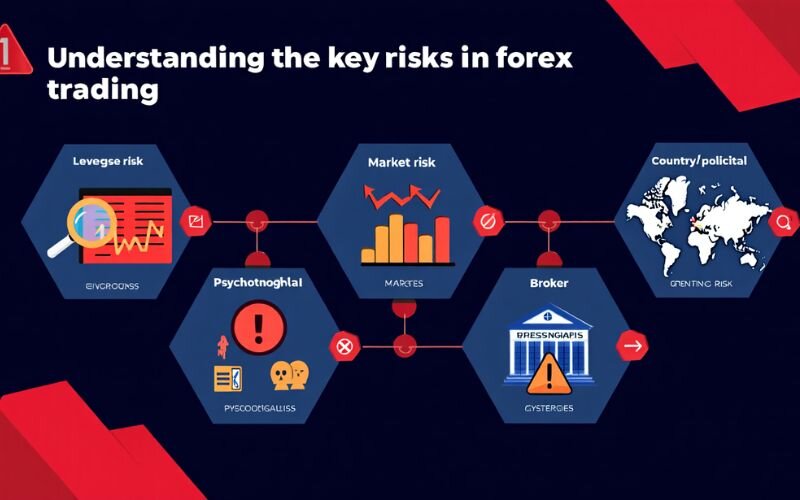
Can you get rich trading forex? It’s important to be realistic. Forex trading offers profit potential, but it's not a scheme for quick wealth. Success demands considerable knowledge, skill, discipline, and effective risk management. Many beginners lose money because they underestimate these risks. Focus on consistent, disciplined trading and sound risk management rather than chasing riches.
9. FAQ about forex exchange trading
Here are answers to some common questions beginners have about forex exchange trading:
Q1: What is forex trading, and how does it work?
A: Forex trading, short for Foreign Exchange trading, is the act of buying one currency while simultaneously selling another, with the goal of profiting from changes in their exchange rates. It operates in a global, decentralized marketplace where currencies are traded 24 hours a day, five days a week, primarily through a network of banks, financial institutions, and individual traders. The price of a currency pair is determined by supply and demand.
Q2: Is $100 enough to start forex?
A: Many brokers allow you to open an account with $100 or even less. However, trading with such a small amount of capital makes effective risk management more challenging and limits profit potential. More important than the initial amount is your knowledge, strategy, and discipline. Beginner's Tip: Consider such a small sum as "tuition money" to experience the live market after you've practiced extensively on a demo account, rather than expecting significant returns.
Q3: What is "exchange" in forex trading?
A: In forex trading, "exchange" refers to the fundamental act of swapping one currency for another. For example, when you trade the EUR/USD pair, you are "exchanging" Euros for U.S. dollars, or vice-versa, based on the prevailing exchange rate. The entire market is built on this principle of exchanging currency values.
Q4: How do forex traders make money?
A: Forex traders aim to make money by correctly predicting the direction of movement in the exchange rate between two currencies. If they buy a currency pair (go long) and its value increases, they can sell it back at a higher price for a profit. Conversely, if they sell a currency pair (go short) and its value decreases, they can buy it back at a lower price for a profit. Leverage can amplify these profits, but it also amplifies potential losses.
Q5: Is forex trading difficult to learn?
A: The basic concepts of forex trading are not overly complex and can be learned relatively quickly. However, achieving consistent profitability is challenging and requires significant time, dedicated learning, disciplined practice, and emotional control. The market is dynamic, and mastering it is an ongoing process of development.
Q6: What is the best currency pair to trade for beginners?
A: Major currency pairs like EUR/USD, GBP/USD, USD/JPY, and AUD/USD are generally recommended for beginners. This is because they typically offer high liquidity (many buyers and sellers), lower spreads (trading costs), and abundant information and analysis is available for them, making them somewhat more predictable than other pairs.
Q7: Do I need to be an economics expert to trade Forex?
A: Not necessarily. While a strong understanding of economics is certainly an advantage, many successful traders focus primarily on technical analysis (studying price charts and patterns). However, having a basic understanding of how major macroeconomic factors (like interest rates, inflation, and employment data) influence currency values is highly beneficial for all traders.
10. Conclusion
Understanding what is forex exchange trading and grasping its core concepts provides a solid foundation for anyone curious about the world's largest financial market. We've explored its mechanics, key participants, the motivations for trading, and crucially, the associated risks. Forex can be an engaging field, offering opportunities for those who approach it with diligence and respect.
The path to becoming a proficient trader is not a sprint, but a marathon. It demands continuous learning, disciplined practice, and resilient risk management. Your journey into forex will likely have ups and downs. The most important things are to never stop learning from both your successes and your mistakes, always manage your risk prudently, and strive to keep a level head through all market conditions.
Your exploration of the forex exchange trading world has just begun. Have questions about Forex trading? Ready to dive deeper? Check out other essential topics in our Forex Basics learning hub. Explore our next article on H2T Finance to see how Forex compares to other markets.
